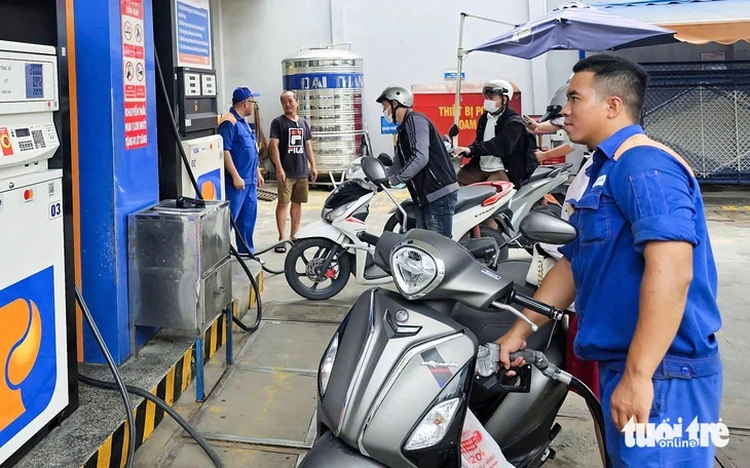
A staff member at a gasoline station fills the tank of a motorcycle in Vietnam. Photo: Nhat Xuan / Tuoi Tre
Under the plan, all gasoline blended, distributed, and sold for vehicles with gasoline engines must be E10, containing 10 percent ethanol, from 2026 through 2030, marking the first phase of the roadmap.
Fuel distributors are required to blend fossil gasoline with ethanol to supply the domestic market.
The ministry has tasked the Department of Innovation, Green Transition and Industrial Promotion with guiding enterprises in production, blending, and distribution, as well as preparing national technical standards for E10 gasoline.
Local governments are required to support raw material development, encourage investment in biofuel facilities, and build blending and distribution infrastructure.
Dao Duy Anh, deputy director of the department, told Tuoi Tre (Youth) newspaper that all gasoline grades, including RON92, RON95, and RON97, will be blended with 10 percent ethanol.
He said the transition meets consumer demand for high-quality biofuel compatible with modern vehicles, noting his own use of E10 without issues.
In the second phase, from January 1, 2031 onward, all gasoline sold nationwide must be E15 or other regulated biofuel blends.
The ministry has tasked the department with researching and upgrading technologies, equipment, and production techniques for biofuels, including second-generation fuels, to support the transition from E10 to E15, Anh said.
The mandatory use of these biofuels will consider the vehicle market, economic conditions, and domestic biofuel production and import capacity, while ensuring energy security, the ministry affirmed.
However, businesses have raised concerns over costs and preparation.
A major distributor in the Mekong Delta said it had invested in blending systems but still lacked a required laboratory, with total costs reaching VND30 billion (US$1.14 million), questioning the feasibility of full replacement by 2026.
Another distributor in Dong Nai Province said it would outsource blending due to high costs and uncertain demand.
Bui Ngoc Bao, chairman of the Vietnam Petroleum Association, said a full transition to biofuels requires careful preparation.
While distributors have started adjustments, he stressed that official regulations must be approved promptly to allow smooth implementation.
“Beyond logistics, companies need time to prepare blending products and related processes. The roadmap should be announced early so enterprises can carry out tasks such as tank cleaning and other technical adjustments on time.
“Consistent standards and technical specifications must also be introduced to ensure proper execution,” Bao said.


Max: 1500 characters
There are no comments yet. Be the first to comment.